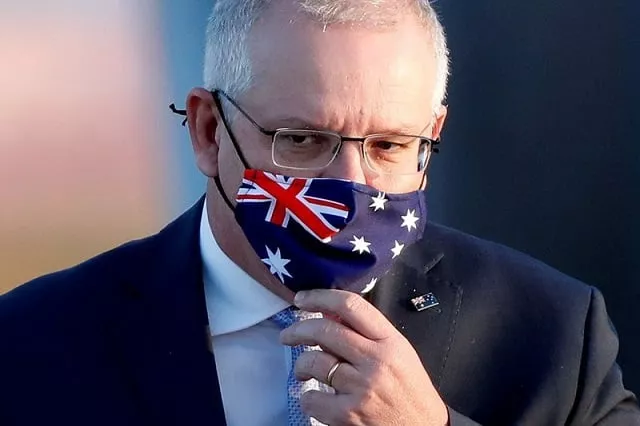Australians may face longer lockdown after "reckless" mass protests
The outbreak, which began in June, is being driven by the highly contagious Delta variant
MELBOURNE:Australia's New South Wales logged its second-highest daily increase of the year in locally acquired COVID-19 cases on Sunday amid fears of a wave of new infections after thousands of people joined an anti-lockdown protest.
"In relation to yesterday's protests, can I say how absolutely disgusted I was. It broke my heart," Gladys Berejiklian, the premier of the country's most populous state, told reporters.
"I hope it won't be a setback, but it could be," she said.
There were 141 COVID-19 cases reported, down from 163 a day earlier. The outbreak, which began in June, is being driven by the highly contagious Delta variant of the virus, and has now infected 2,081 people in New South Wales. There are 43 people in intensive care, up from 37 a day earlier.
Under fire for a slow vaccine rollout, Prime Minister Scott Morrison said more vaccine supply was not going to ensure New South Wales gets out of lockdown, but what was needed was an effective, properly enforced lockdown.
"Let me be clear - there's not an alternative to the lockdown in New South Wales to get this under control. There is no other magic bullet that's going to do that," Morrison told reporters at a televised media conference.
He called the anti-lockdown protests in Sydney reckless and self-defeating.
Read more: Sydney to get extra vaccines as Covid cases mount
While Berejiklian and other state leaders have blamed Canberra for the slow vaccine rollout, critics have said NSW did not enforce its stay-at-home orders, which has led to Delta variant leaks to other states.
At least 38 of the new cases in NSW had spent time in the community while infectious, state health authorities said. Numbers of such cases have stayed stubbornly high even after four weeks of lockdown in Sydney, now expected to be extended beyond July 30.
The state reported two deaths overnight, including a woman in her 30s with no pre-existing conditions.
Despite its struggle with spikes of infections, Australia has managed to keep its epidemic largely under control with a total of about 32,600 cases and 918 deaths.
To help speed up vaccinations in Sydney, the government's official adviser, the Australian Technical Advisory Group on Immunisation (ATAGI), on Saturday changed its advice on the AstraZeneca vaccine, urging anyone in the city under the age of 60 to strongly consider getting vaccinated with it.
ATAGI had previously advised against the AstraZeneca vaccine for people under 60 due to concerns about blood clots.
"In the context of the current risk of COVID-19 in NSW and with the ongoing constraints on Comirnaty (Pfizer) vaccine supplies, all adults in greater Sydney should strongly consider the benefits of earlier protection with COVID-19 Vaccine AstraZeneca rather than waiting for alternative vaccines," ATAGI said in a statement.
Morrison said on Sunday the government has secured an additional 85 million doses of the Pfizer vaccine, but they will only be delivered in 2022 and 2023.
"To have those booster shots pre-ordered means we can go into 2022 with confidence," he said.
Australia's Victoria state reported 11 locally acquired COVID-19 cases on Sunday, down from 12 a day earlier, raising hopes the state will end a hard lockdown imposed 10 days ago.
State Premier Daniel Andrews said it was too early to say whether restrictions will be eased on Tuesday, but: "At this stage, though, things are going well."
All of the cases were linked to the current outbreak clusters and all of them were in isolation throughout their infectious period, the state's health department said.
South Australia reported three new cases on Sunday.


COMMENTS
Comments are moderated and generally will be posted if they are on-topic and not abusive.
For more information, please see our Comments FAQ